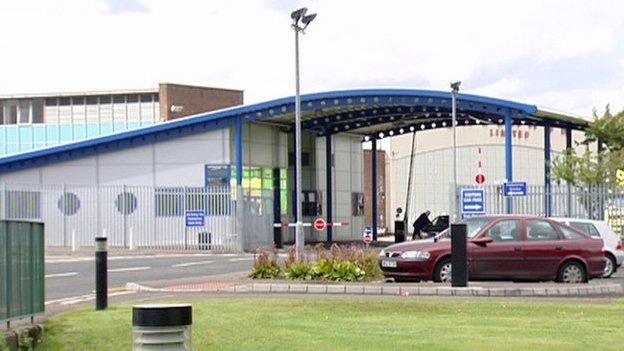Ballymena cigarette factory JTI Gallaher to close
- Published
Management at the JTI Gallaher cigarette factory said staff have been in tears after it was announced the Ballymena plant is to close with the loss of more than 800 jobs.
Cigarette maker JTI Gallaher is to shut its factory in County Antrim with the loss of more than 800 jobs.
Workers at the Ballymena plant were informed by management on Tuesday.
North Antrim MP Ian Paisley Jr said it was a "body blow" to the Northern Ireland economy. He said the redundancies would begin in May 2016.
He added it "effectively starts a 90-day consultation with workers, not only in Ballymena but across JTI's European footprint, to cease production".
'Significant changes'
"Each year almost £60m is pumped into the local wage economy by JTI - from 2017 that will be over," he said.
Gallaher, which made Silk Cut and Benson & Hedges cigarettes, was taken over by Japanese firm JTI in 2007.
The factory is a major employer in Ballymena.
Ian Paisley, MP for North Antrim, called the decision to close the factory a "blow for the Northern Ireland economy"
JTI said it was restructuring its manufacturing facilities "as a result of significant and sustained changes impacting its global business".
"The challenging economic environment, excise tax pressure coupled with illegal trade has triggered industry volume contraction in a number of key European countries," it said.
The company said these problems had been compounded by European Union cigarette packaging legislation.
Anti-smoking legislation is being introduced across the EU in an attempt to cut the number of smokers by 2.4 million.
'Terrible news'
Among the measures in the EU Tobacco Products Directive, picture health warnings will have to dominate the front and back of all packaging, flavoured cigarettes such as menthol will be banned and all packs must have at least 20 cigarettes to leave room for health warnings.
Member states have until 2016 to introduce the legislation.

In a joint statement, Northern Ireland's First Minister Peter Robinson and Deputy First Minister Martin McGuinness said JTI Gallaher was major employer and the announcement was "terrible news for many loyal workers, many of whom have given years of service to this firm over generations".
"We will make every effort to mitigate the impact of the job losses and we welcome any opportunity to meet with locally elected representatives to identify what options are available to those affected, the ministers said.
"The executive will work closely with both the enterprise and employment and learning ministers to ensure all possible avenues are explored."
Northern Ireland Enterprise Minister Arlene Foster said the move was "bad news for the Northern Ireland economy as a whole".
Enterprise Minister Arlene Foster has called the decision "devastating"
She said she had written last week to Health Secretary Jeremy Hunt to raise her concerns about the implications of the legislation for the firm.
"I urged him to commission further research to ensure that any health benefits were not offset by an increase in the trade of illegal tobacco, and I am deeply concerned that the magnitude of the implications for the NI economy were not fully considered," she said.
Mrs Foster added that the Northern Ireland Executive would "do all that is possible to limit the impact of the redundancies".
'Cost-saving measure'
Davy Thompson of the Unite union said they would enter into a consultation but he believed the closure was "a done deal".
"We understand the smuggling issues, we understand the kickback from the EU Directive will have an impact, but does it have to close? We don't believe so.
"In terms of the EU Directive, production would drop by maybe 40% but for the other 60% they could have kept the plant open - it's just a cost-saving measure."
Local people were concerned about what the announcement will mean for other businesses in the town
JTI said it had begun consultations on proposals to close its facilities in Northern Ireland and Belgium, with production possibly moving to Poland and Romania.
The firm said its restructuring would be phased in, with factory closures completed between 2016 and 2018.
The Gallaher Tobacco Company was founded in 1857 by County Londonderry teenager Thomas Gallaher, who began by setting hand-rolled tobacco from a cart.
- Published26 February 2014
